VALLEJO — For years, the Vallejo Police Officers Association maintained sole control over who became a Vallejo police officer. During that time, the department had no set recruitment standards for hiring or disqualifying a candidate, no defined passing score for written or physical agility tests, nor a clear definition of the testing process or application procedures for recruits, according to a draft internal assessment of the department.
That assessment by two veteran police recruiters from 2020 — recently made public by a public records request from the Vallejo Sun — also says the lack of consistency in the recruitment process could have led to “potential exposure” to complaints to the Equal Employment Opportunity Commission, the government entity overseeing violations of federal anti-discrimination laws.
The city’s Human Resources Department had no involvement in hiring new officers and only sworn officers were part of the hiring process. The department neglected recruitment efforts at colleges, where potential recruits would hold a four-year degree in evidence-based policing tactics. Instead, the VPOA preferred officers from other departments, a process known as a lateral transfer, and allowed three years of military service to substitute for minimum education requirements for honorably discharged veterans.
As a result, the majority of officers who came to work at the Vallejo Police Department were not put through a uniform testing process and instead were hand-picked by sworn officers represented by the VPOA. Most current VPOA board members — including its current president — were lateral transfers to Vallejo.
The lack of standards in recruitment and hiring could have contributed to a culture where Vallejo police officers used more force per arrest than any other department in California, celebrated on-duty shootings by bending the tips of their star-shaped badges, and promoted rather than punished officers who engaged in violent behavior, including killing at least 19 people in a decade.
Following the Vallejo police killing of Sean Monterrosa in June 2020, the department went more than three years without a police shooting, its longest period in recent memory. During that time, the department was led by Shawny Williams, Vallejo’s first Black police chief who was hired in November 2019 with promises to bring 21st Century policing, oversight, and other reforms to the beleaguered department.
That included bringing in two veteran police recruiters in February 2020, who began to implement several changes: standardizing recruitment and disqualification guidelines, implementing a minimum score for written and physical agility tests, regularly meeting with HR, recruiting on college campuses, and partnering with coordinators and training instructors at police academies in the region.
Such procedures are commonplace in departments across the country but were missing in Vallejo.
But emails show that the recruiters faced resistance from members of the VPOA, which has also challenged other changes to the department’s makeup, such as the city’s efforts to hire a police auditor and creating more non-union positions in the department. It even filed a grievance with the state regarding its new recruitment strategy.
Meanwhile, the VPOA used any person leaving the department to criticize Williams and regularly posted job ads for other departments on its Twitter account. Williams resigned last year. The recruiters also resigned, and the department’s recruitment efforts languished. Staffing would soon drop so low that city leaders declared an emergency.
But the VPOA continues to blame city leaders for the department’s staffing challenges and said the recent declaration asking for help from outside agencies would “do nothing to improve the safety and security of Vallejo residents, businesses, and visitors.”
“Instead, it will result in more officers leaving the Department for better working conditions, a stable working environment, and where their efforts are appreciated,” the VPOA said.
Vallejo Police Department leaders did not respond to written questions for this story.
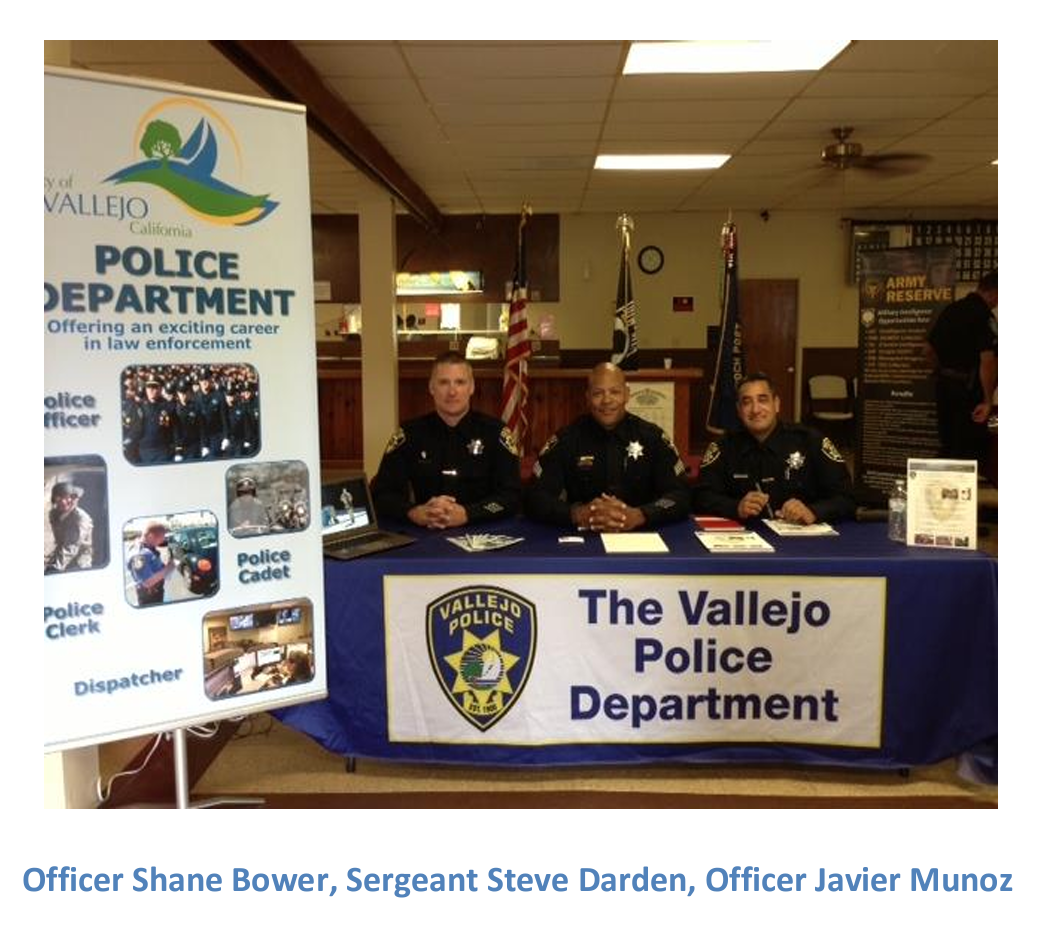
A Sergeant in charge
Before Williams sought to professionalize the Vallejo Police Department’s recruiting process, a sergeant in the Professional Standards division held all clerical duties, from checking an applicant’s minimum qualifications to scheduling interviews with the department’s hiring panel, according to the draft internal assessment of department practices. That started in 2013 under then-Chief Joseph Kreins following the department's deadliest year to date.
"Due to this ineffective and deficient process," the 2020 assessment states, "a vacancy rate of approximately 20% has persisted for sworn personnel for over 10 years."
While all the duties fell on one person, that sergeant also could delay an applicant’s paperwork if he didn’t want the application to move through the process, according to two sources familiar with the process. That process led to a department that was primarily white men who lived outside of Vallejo.
Most recently, that position was held by Sgt. Jared Jaksch. In 2020, he was also a director with the VPOA. He and his supervisor in Professional Standards, Lt. Robert "Bobby" Knight, were in charge of the department’s recruitment, hiring, and training.
Newly disclosed emails published to the city’s public records site offer a glimpse in how that process changed under Williams’ leadership.
Starting in late 2019, Williams brought in veteran police recruiters Tim Jackson and Ron Tabron, who were under Williams’ supervision when he was a lieutenant with the San Jose Police Department. Combined, they had nearly six decades of experience in Bay Area law enforcement.
Tabron grew up in North Carolina and moved to California on a basketball scholarship from the University of the Pacific in Stockton. He started at the San Jose Police Department in 1992, two years after graduation, he told would-be Vallejo recruits on an undated video on GetRecruitedNow.com. In San Jose, Tabron worked everything from patrol to gangs to SWAT and the detective bureau. He traveled the country for San Jose, first picking up wanted fugitives and later as a recruiter before retiring in 2019.
Jackson’s career mirrored Tabron’s. A Bay Area native, he was born in San Francisco’s Hunter’s Point neighborhood before he moved to East San Jose and attended San Jose State University on a football scholarship. Among his rotating assignments over the years, he ran a youth baseball program for the Police Activities League.
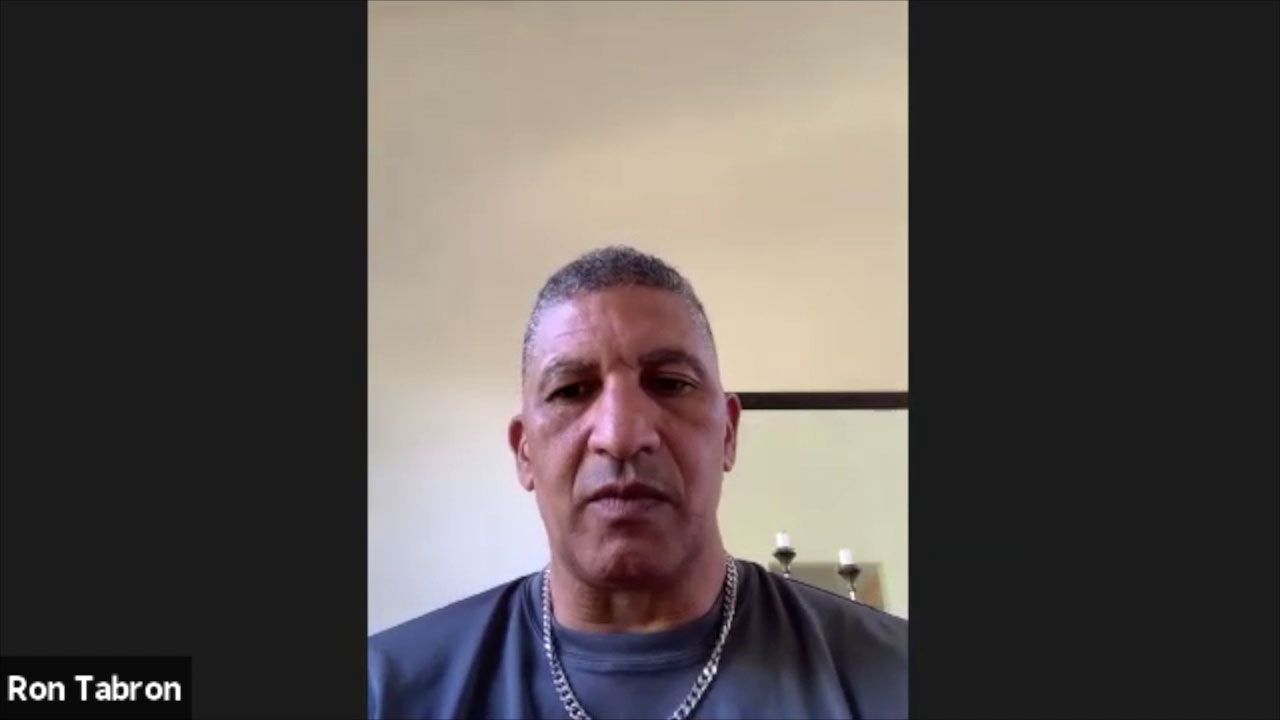
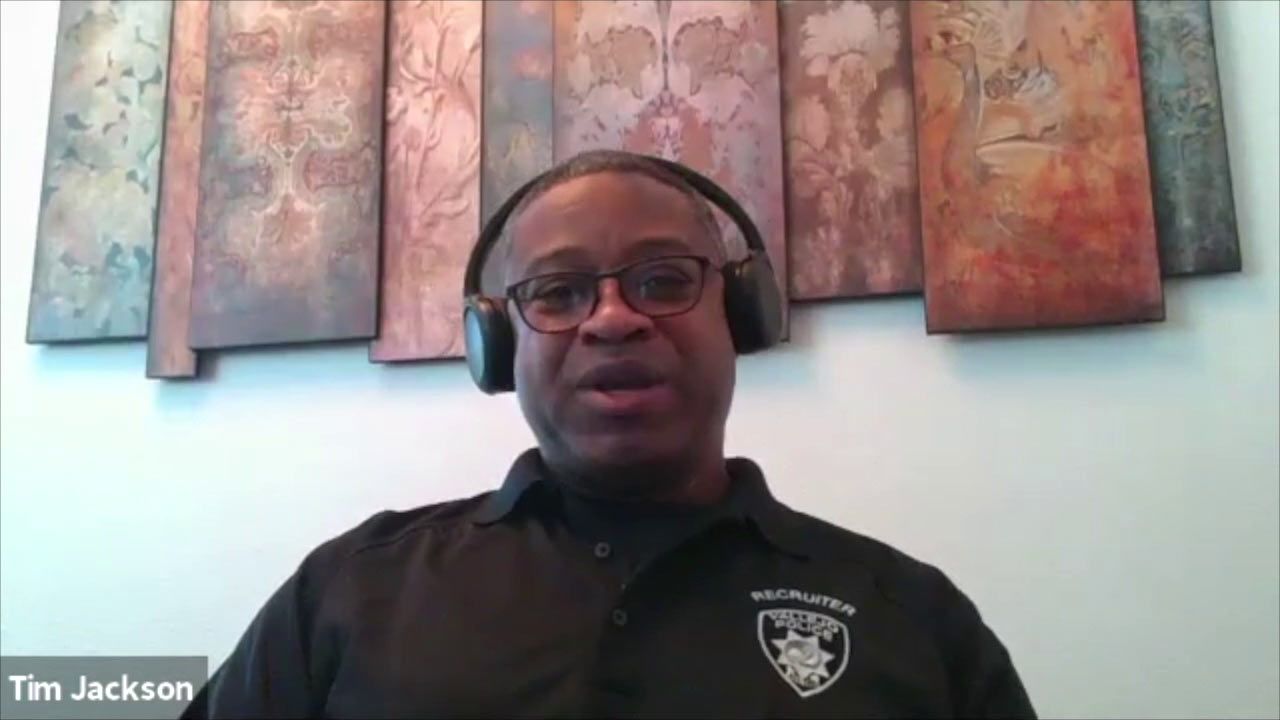
Williams brought on Tabron and Jackson as part-time, non-sworn employees, and they soon drafted the assessment that showed Vallejo police kept no standards in their recruiting or hiring. Williams moved to have HR involved in most of the hiring process and worked to have bare minimum standards for written and physical testing.
“The Department projects, with the current process in place, that by the spring of 2022, all the vacant sworn police positions will be filled, a comprehensive recruitment process will be established, and a solid foundation to continue our recruitment efforts solidified into the structure of the Police Department, Vallejo Community and Human Resource Department,” the assessment concluded. “The Chief believes that with the current improvements in place, the department will make great strides in developing a qualified and diverse pool of applicants that reflects the rich diversity of the Vallejo community.”
But Williams and his recruiters soon encountered resistance from veteran cops when implementing the changes, who both complained that they didn’t have the capacity to take on the heavier recruiting load but refused to let civilian staff handle the process without them.
One of the first things police recruits have to pass is a physical agility test, also known as the Work Sample Test Battery. That was something Jaksch determined in late March 2020 that the department could do themselves at their training center on Mare Island. All they had to do was build an obstacle course and decide on what the minimum score would be.
Knight responded that he was concerned his staff “may be biting off more than we can chew” by taking on physical testing on a regular basis, but he did like the idea of doing tests for other departments and using the events as recruitment events.
Later, Knight told the recruiters that their plans of running three tests a month may be too much. They replied that sworn officers didn’t need to be there if it could avoid a bottleneck in the recruitment process.
“As long as we can get access to the equipment Tim and I could do it,” Tabron wrote on June 18. “We have a lot of people that need to complete the [test] before we can do interviews.”
About 20 minutes later, Knight responded that he understood HR and the recruiters were now part of the recruitment process, but dates and times for testing “needs to be cleared through me. My staff in Prof Standards has created the equipment, prepared the venue and will have to pull the resources to assist you with the test… please please please keep me in the loop on these types of discussions and decisions.”
That email set off one of many contentious email exchanges between Knight, Jaksch and the recruiters, Tabron and Jackson.
“The tone of your email is implying that you have a problem or concern that we for sure need to address,” Tabron replied. “I don’t like the fact that you are saying your staff created the… testing facility as if we were not willing to help. I hope that it’s just poor communication as the way it reads and it‘s not some other [underlying] issues you or your staff have with this process.”
Knight responded that any discussion of recruitment “outside the presence of VPD Professional Standards are unproductive to our common goals and undermining to our work group.”
“If you fail to realize that [then] we will have to agree to disagree,” Knight wrote. “In relation to miscommunication I agree that is a problem and continues to be a reoccurring problem. That conduct needs to be addressed immediately.”
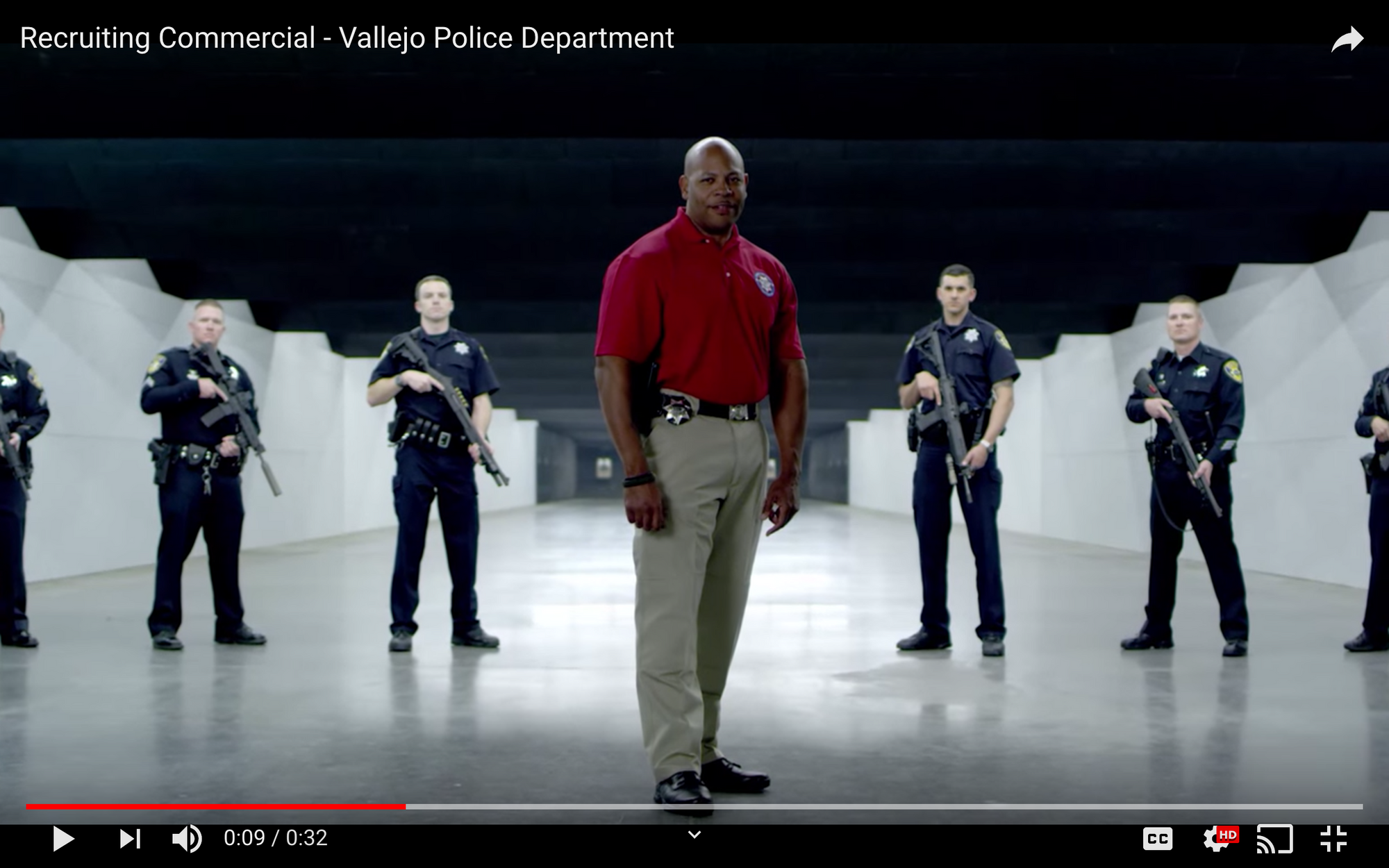
Assembling community interview panels
One new aspect to the Vallejo police hiring process under Williams was convening interview panels consisting of ranking officers and community members.
One of those groups who participated in the interview panels was the Theta Pi Chapter of the Omega Psi Phi fraternity. Theta Pi Brother Henri “Hank” Morris emailed members on June 2, 2020, seeking their help. “The chief is NOT getting any support from the POA and [they] are resisting any changes in the department that he wants to implement to create REAL change in Vallejo,” he wrote.
Earlier that day, Vallejo Det. Jarrett Tonn shot 22-year-old Sean Monterrosa during wide scale looting and protests in response to the police murder of George Floyd in Minnesota. It was the fourth on-duty shooting for Tonn, a lateral transfer from the Galt Police Department.
The recruiters told the panel members via email that day that the interview panels would be delayed “due to events going on around the country” and in the Bay Area.
“Chief Williams recognizes that the community is the base platform from which we must build upon. It is our understanding that Vallejo has never included the community. Well, that is changing!” Jackson wrote in an email to panel members on June 3. “Together we will rise and bridge the gap between the community and the Police Officers that serve the community. Thank you for being a part of the solution!”
Mina Loera-Diaz, who sat on interview panels and was elected to the Vallejo City Council in 2020, responded that she understood the reasons for the delay in interviewing applications, but said, “now more than ever we need to ensure that the new officers that join our Police Department will work for the wellbeing of our city and community.”
On June 23, the department issued a press release encouraging people to apply to the police force as cadets or lateral transfers. In the release, Williams said the efforts were aligned with the OIR Group’s third-party assessment of the department, which said that the department needed to place greater emphasis on “racial, gender and ethnic diversity in recruiting efforts.”
Vallejo police held their first physical testing at their facility on Mare Island in late June 2020. Fewer than 20 people signed up, so Tabron told Jaksch that the two extra Vallejo police personnel wouldn’t be needed because he, Jackson, and two people from HR would be there. It’s unclear if Jaksch protested that move.
After physicals, Vallejo police had about 25 candidates processed and ready for the four-hour panel interviews with officers and community members. Williams told the HR department that he wanted corporals and above on those boards.
“My concern with allowing certain officers and not others would be complaints or a grievance from the VPOA,” Williams said in an email.
‘Team Jared and Bobby’
The first community interview panel was held mid-July 2020 and included 14 recruits, six entry-level officers and two lateral transfers. Fourteen moved on in the process, which would include interviews with Chief Williams and then-Assistant Chief Joe Allio before being given a conditional offer letter as Jaksch began the backgrounding process.
The immediate response was overwhelmingly positive.
Stephanie Siefuentes with the city’s HR department described them as “very successful oral panel interviews” and said panel members “were not on board with this when they first heard about it, but now having experienced it, they really like it; liked the consistency of the process across the board; panel members were very happy to have participated in the process and were interested in being included in the future.”
Siefeuntes credited Williams’ recruiters for seeking candidates from colleges and academies to get what panel members described as the “best quality of candidates they had seen.”
“This is exceptional teamwork that has built community trust, support and legitimacy,” Williams replied. “I am truly grateful! I couldn’t thank you all enough.”
Jackson, one of the recruiters, responded: “Vallejo is definitely moving forward towards brighter days. I say, ‘Let’s keep it going!”
Jaksch, however, expressed serious issues with the process. He wrote in a July 19, 2020, email to Sifuentes and April Adams, also with the city’s HR department, that “more than one participant from VPD” had voiced concerns about Jackson and Tabron’s role.
“I felt it was imperative and extremely urgent that I let you know that several people felt very uncomfortable with Tim and Ron being involved in the oral board process,” Jaksch wrote. “Specifically - they did not appreciate Tim/Ron trying to influence their scoring of specific candidates. Is that normal for recruiters to be not only privy to the interviews but attempting to influence the outcomes?”
Two days later, Sifuentes responded, saying Jackson and Tabron “did not participate in the scoring at all.”
“If several people told you they were very uncomfortable because Ron and Tim were trying to influence scores, I’d like to know who those people are so I can get more specific details/examples about that,” she wrote. “April and I sat on all of the panels, and can attest that nothing like that ever happened. These are pretty serious accusations, so I’d like to get any misunderstandings cleared up before the next round of interviews.”
Siefuentes also forwarded Jaksch’s accusations to Jackson and Tabron.
“You have to be kidding me! What is wrong with these guys? At no time did I try to influence anyone on their scores,” Jackson responded. He said that Jaksch’s accusation “leads me to believe that it is imperative now more than ever that Ron and I continue to monitor. For whatever reason, they are intimidated by Ron and I. In my opinion he just showed who’s team he is on: Team Jared and Bobby.”
The emails released via public records request do not show whether Jaksch’s concerns were further investigated. Jaksch did not respond to a request for comment.
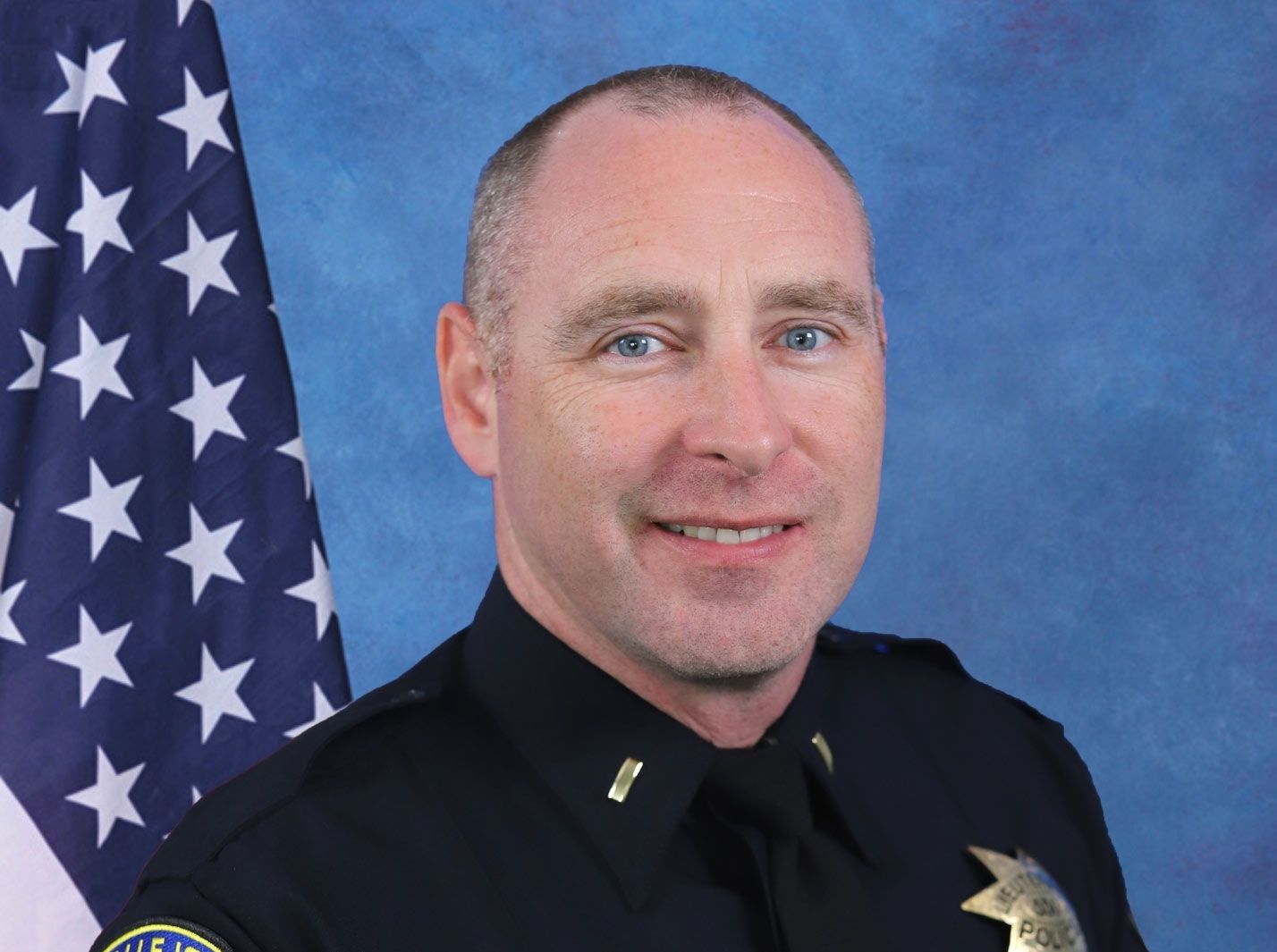
Also that July, Knight didn’t approve Jackson and Tabron’s hours during a pay period, so they didn’t get paid on time. He scheduled a weekly Zoom meeting starting the week after the first community boards between he, Jaksch and the two recruiters. “This should help elevate [sic] miscommunication and allow me to get updates on your projects and corresponding work hours,” Knight wrote on July 12, 2020.
The following day, Jackson sent a one-line email from his iPhone letting Knight, Jaksch and Tabron know he reserved five spots — the same number as the previous year — in the 191st police academy in Contra Costa County starting that October.
Knight, apparently, wasn’t pleased.
“I really would have preferred you discuss with me before reserving police academy spots on behalf of Vallejo PD,” Knight responded. “Coordination with the various police academies has always been a duty of the Professional Standards Administrative Sergeant. Jared and I were already discussing it this morning when he received the email as well.”
“Yur [sic] kidding me right?” Jackson responded. “You don’t remember the conversation in a meeting a few months back when you wanted us to lock down academy spots?”
Besides seeking out fresh, young recruits from colleges and police academies, Jackson and Tabron also monitored staffing at other Bay Area police departments. In July 2021, they were keeping an eye on the nearby Richmond Police Department, which was looking to cut its police budget and possibly bleed officers.
“It’s very early in the process with the city and POA but as of now there have not been anything decided,” Tabron wrote to the Vallejo recruitment team. “The POA is aware that we are hiring and if it get to the point that a decision has been made to lay off officers they will set up a meeting.”
They were also keeping tabs with staffing issues in San Francisco and San Jose.
“Laterals are a rare find and can pick any agency they would like to work for,” Tabron wrote. “It’s like a unicorn: if you find one you better catch them fast.”
But Vallejo wouldn’t be able to catch any recruits fast enough and staffing levels have dropped ever since. The reason for that varies, depending on who you ask.
States of emergency
In October 2020, the Vallejo City Council declared a state of emergency. Williams said the department had an “internal crisis,” citing things like officers bending the tips of their badges following a shooting and other issues highlighted by an assessment of department culture by consultants with the OIR Group.
The VPOA contended the department staffing level was one of the greatest problems affecting safety in the city. Under the emergency declaration, hiring power was taken away from members of the VPOA, which it described as an “authoritarian power grab.”
In a rare public rebuke of the police union, the police department’s first civilian public information officer, Brittany K. Jackson, said in a press release in September 2020 that VPOA solely controlled the hiring process for years but let vacancies linger, such as only hiring two of 72 lateral transfers who applied to be a Vallejo police officer in a two-year window. The release also said the VPOA filed an unfair labor practice charge in response to the city’s new approach to recruiting officers.
The emergency declaration shifted hiring to then-City Manager Greg Nyhoff, Williams, and the two recruiters Williams hired from San Jose.
After that, the union regularly began issuing statements about staffing, something it almost never publicly mentioned before. According to a VPOA statement, staff went from a recent high of 111 officers in October 2020 to a low of 77 in July this year.
The VPOA said that officers were leaving because of Williams’ leadership. But some high-ranking officers and others were either fired or left amid scandals.
Among those who left the department since then were two lieutenants — Todd and Kent Tribble — who allegedly brought the department’s badge-bending practice as lateral transfers from Concord. Lt. Fabio Rodriguez, who was found to be responsible for evidence destruction in the Monterrosa killing, transferred to Napa. Tonn was fired and reinstated this year. Two other officers involved in the Monterrosa incident – Detective Bretton Wagoner and Capt. Lee Horton – both left ahead of the findings of an outside investigation that sustained policy violations against them. Officer Ryan McMahon was fired for endangering another officer when he was one of six officers who shot and killed Willie McCoy in 2019. Officer Zachary Jacobsen, who killed Angel Ramos in 2017 and allegedly bent McMahon’s badge, left earlier this year.
McMahon was also a lateral transfer. He was participating in a ride-along with then-Vallejo Police Officer Sean Kenney in 2012 when Kenney shot one of three people he killed that year. McMahon transferred to Vallejo in 2017. The following year, he chased, beat, Tased and shot Ronell Foster in the back and the back of the head, killing him. (Jaksch would clear him in that shooting. The city settled a lawsuit with Foster’s family for $5.7 million.) A lawsuit by a former police captain alleged that McMahon bent two tips of his badge to commemorate the Foster and McCoy shootings.
After Williams fired him, McMahon was hired in August 2022 by the Broadmoor Police Department, but then lost that job following Sun reporting on his history of poor judgment.
Despite a repeated pattern of violent officers coming to the Vallejo Police Department from other departments, the VPOA prefers lateral transfers.
Lt. Michael Nichelini, the current head of the VPOA, was a lateral transfer from Oakland, where investigators there said he shouldn’t have a public-facing role in the department due to sustained policy violations. Williams fired him for allegedly threatening a journalist, but he won his job back last year. He is pursuing a $10 million lawsuit against the city, alleging the city engaged in a scheme to dismantle the union’s leadership. He took over as head of the VPOA at the start of 2020.
Nichelini, in response to a request from the Sun, said that the VPOA never controlled recruiting efforts “nor do we run day to day operations anywhere within the Police Department.”
Under Nichelini’s leadership, the VPOA has been the loudest critic of Williams’ recruitment efforts, faulting him for not more aggressively pursuing lateral transfers and falsely claiming in a February 2021 statement on its website that Williams and his leadership team were “focused solely on hiring new police officer trainees that must attend a six-month police academy and then pass a 6-12-month field training program.”
Nichelini said “staffing has plummeted” since Williams transferred recruiting to HR and civilian staff.
“The Chief of Police has always and continues to review and approve each step of the process,” Nichelini told the Sun via email. “This transfer of work coupled with the bigger issue of being without a fair and competitive contract for 18 months has directly caused the number of officers to decline and the Department has failed to recover to pre Williams’ numbers.”
The VPOA took a vote of no confidence in Williams in July 2022. Williams resigned that November. Assistant Chief Jason Ta — who Williams also lured away from San Jose — has served as interim chief since then.
Ta did not respond to questions about the city’s current recruitment and hiring practices.
In July, the city declared its second state of emergency regarding its police department in three years. This time, it was due to low staffing levels. The city’s messaging has echoed VPOA talking points, stating it takes about 18 months to get a new recruit into the department and asks for city staff and council to “look into creative ways to recruit, such as higher pay for lateral officers and incentives to retain current officers.”
But the department has not updated parts of its recruitment information page since Williams left. Its posts on GetRecruitedNow.com include a broken link to a video of Williams and a video of Jackson and Tabron, his two hand-picked recruiters, who have both been gone for months.
“Hopefully, you guys will all go to Vallejo because we could use you,” Jackson said in the video with a laugh. “We’re hiring a lot out there.”
Before you go...
It’s expensive to produce the kind of high-quality journalism we do at the Vallejo Sun. And we rely on reader support so we can keep publishing.
If you enjoy our regular beat reporting, in-depth investigations, and deep-dive podcast episodes, chip in so we can keep doing this work and bringing you the journalism you rely on.
Click here to become a sustaining member of our newsroom.
THE VALLEJO SUN NEWSLETTER
Investigative reporting, regular updates, events and more
- policing
- government
- Vallejo Police Department
- Vallejo Police Officers Association
- Jared Jaksch
- Robert Knight
- Shawny Williams
- Michael Nichelini
- Ron Tabron
- Tim Jackson
- Stephanie Sifuentes
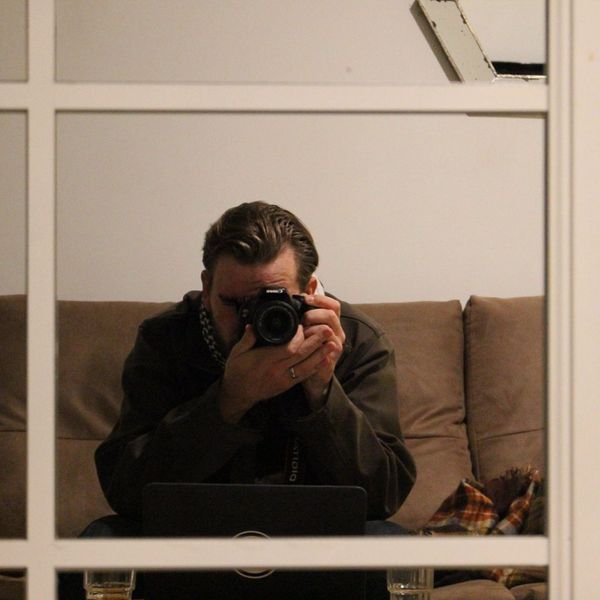
Brian Krans
Brian Krans is a reporter in the East Bay who covers public health, from cops to COVID. He has written for the Oaklandside, Healthline, California Healthline and the Appeal.
follow me :




